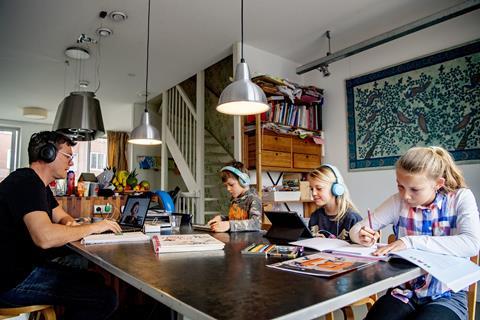Teacher and homeschooler Ian Horsewell gives his view on how to manage the needs of parents and students while schools are shut

Where we are
We’d never planned to home educate our eldest; it just kind of happened. From October of year 6 to the end of what would have been year 9 (so from age 10–14), my wife and I were both parents and educators. As an experienced teacher myself, this was a deeply strange experience. Last September our three children all started at new settings (reception, secondary school and college) and, to be honest, we may have breathed a sigh of relief.
And then there was a pandemic.
Most readers will have probably seen the quote going around social media. ‘You’re not working from home. You’re at home during a crisis, trying to work.’ It’s worth bearing this in mind for those classroom teachers who are currently deciding how to set work which will take place at home, rather than in school. Your students are not being homeschooled. They are at home, during a crisis, being supported by their schools and teachers.
What teachers need
The first thing I’d like to say, as a parent, is ‘Thank you.’ Whether you’ve set loads of work so far, or almost nothing; whether you’ve been in school supporting the children of key workers, or at home herding your own while trying to get your remote access working; whether you have your own classes to think about, or you’re one of the SLT colleagues trying to think about the bigger picture: thank you. The immediate frenzy has now paused, and during your theoretical Easter break, now is the time to pause and regroup so you can act rather than react to the situation.
What parents need
By now, parents and their children will have found a new routine. It will be different for every family, but they will be trying to fit some kind of education into that. Many parents will be trying to work from home, with varying degrees of success. The ratio of keyboards available to people who need them may not work very well. Providing meals will vary from awkward to impossible, a problem many schools have moved heaven and earth to help with. (Again, thank you.) We can make their lives easier by thinking about what we are trying to achieve, and considering how the household context may limit what is possible. Every parent feels guilty right now because they can’t do enough, so anything we can do to make the process easier will be appreciated.
- Are assignments shared in a common format such as PDF?
- Are links mobile-friendly? How have you supported students without reliable web access?
- Can the work set be done on paper to reduce problems with family members sharing computers?
- Have you been clear about what is most important and what is a useful extra?
- Can you offer ‘further learning’ with links to YouTube or the BBC resources that are coming?
- Could you encourage students to research STEM careers when they’re in touch with friends and family members?
It will really help parents to know that you’re expecting them to improvise, and that’s okay. As teachers we need to accept that by offering a routine, you’re helping those parents to maintain as much normality as they can. Sometimes that will seem the biggest benefit of the work you send home.
What students need
Of course you want your students to develop their science understanding. The reality is that, without a teacher’s input, there’s a limit on what new things your students can learn. Review activities to consolidate their subject knowledge is a really good use of their time, and they don’t all need to be created by you personally; one approach is to make links to the wider world and careers. Subject associations (RSC, RSB, IOP) are sharing links for home-suitable work, and groups on social media are, as ever, a good place to ask for suggestions (on Twitter the hashtags #cogscisci and #asechat are a good start ). We know that students need direction to focus on what matters most:
- Have you made it clear what a successful effort looks like?
- Have you emphasized what isn’t a good use of their time?
- Do the activities mix factual recall and tests of deeper understanding over the long term?
- Are you ready for the wider range of outcomes caused by parents ‘helping’?
- Can you link the topic to open-ended practical tasks suitable for the home (considering H&S as discussed here by CLEAPSS)?
Including apparently simple practical challenges, similar to what you might use in lunchtime clubs or subject days, can be a good way to maintain engagement. Students may not have a prep room at hand, but they probably have measuring cups, a tape measure and a stopwatch. If the focus is on working scientifically, rather than a curriculum point, this doesn’t need to be limited to primary students, either. It’s not that long ago that investigating a pendulum was part of GCSE coursework. Making models from junk can still provide data to analyse and explain.
Feedback to students is more important than ever, no matter how your school is managing the contact between staff and home. Tell students when they’re right, and what they can do to improve if they’re not yet there. In many ways, you will have less control over what students do than ever before, so focus on the things you can influence. Congratulate those who rise to the challenge of learning with less structure, and be ready to support those who find it harder, now or when they return. This too will pass.


















No comments yet